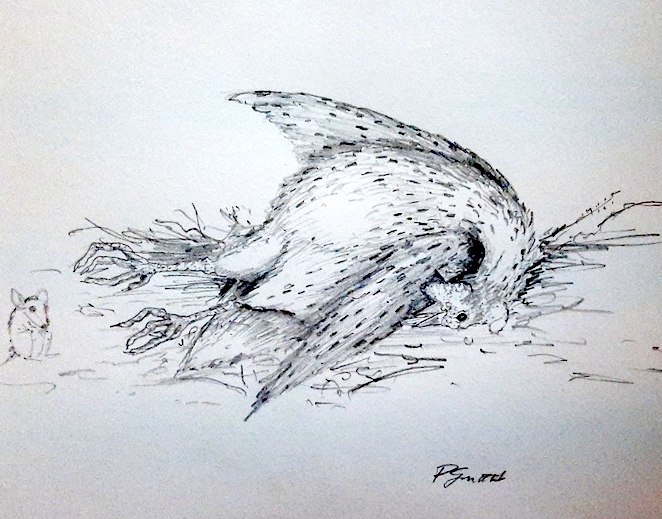Last month several cities from Texas to California experienced triple digit temperatures. And the heat was made worse some places by humidity. Plus, due to La Niña, the heat’s to last for many areas. Further, we all know how important heat safety is for people. But what about animals? For instance, do you know how to take care of chickens in hot weather?
I’m sure everyone’s heard or read the story of the recent heat that killed the ~ 2000 head of Kansas cattle. Although cattle can sweat to some degree, chickens can’t. Therefore, they rely on us to make sure they don’t overheat.
Most poultry people say that chickens will pant in 80° weather. However I think that can depend on where you live. If you live further north, your birds will be used to temperatures there, not where I live. And vice versa. So you see, birds can acclimate to the weather.
For example, I have a flock comprised of mostly Ameraucana chickens, and they don’t start panting until the temperature gets to the 90s. However, the juvenile birds aren’t used to the temperatures. Thus, they look more bothered by the heat than the adults. Also, if the weather were to spike suddenly, then that could be an issue for all of them.
Additionally, chickens normally lose heat through their combs, wattles, and other non-feathered areas. But once the temperatures rise, heat loss changes to evaporative, which causes water loss. And a lot of water loss causes changes in electrolyte balance.
Signs of Light and Moderate Heat Stress
- Chickens may pant, but otherwise still run around normal
- And they may hold their wings away from their bodies
Solution for Light to Moderate Heat Stress

- Provide fresh clean water in waterers
- Add ice to water
- Cool down the run with hose
- And provide icy treats
Dangerous Signs of Heat Exhaustion

- Panting heavily
- Wings held away from body
- Pale comb
- Or lethargic, limp, or unconscious
Solution for Heat Exhaustion
If you have a chicken in the above conditions, act quickly, because they are in danger of dying. The most important thing is they need to be cooled quickly.
- Submerge them (to their necks) in cool water, NOT ice water.
- And then move them indoors until they recover.
- Also, provide them with electrolyte water in a medicine dropper, careful not to aspirate them.
Preventing Heat Stress and Exhaustion

It’s much easier to prevent a problem than trying to fix one when it occurs. Since we already know it’s going to be a hot summer, especially in the Midwest, let’s plan on an ounce of prevention.
Shade
- Trees in the yard
This is more of a longterm project. But when we moved into our house over 7 years ago, there were only 2 decent sized trees and a few small trees. Since living here, we’ve added several fruit trees and pruned the others. Now the birds have a choice of where to sit in the heat of the day.
- Tarps or cloths on the run
If your run doesn’t have a roof, or it gets full sun, then add some type of shade for your birds.
Cooling Down the Coop and Run

- Misters
For evaporative cooling, this is an inexpensive solution. However, if, like us, you have well water, then you’d have to add a salt system to your outside water. Then that would require a whole-house water filtration system. And it could be cost prohibitive. So…
- Hose the run
Spray down the dirt in the run with the trusty hose. So long as you don’t make it muddy, it will cool it down for the birds. You can also spray the outside of the coop for added benefit.
Ventilation
Likely your run will have enough ventilation. But coops are usually smaller. So install
- Roof vents
- Predator-proof windows to increase airflow
- And if you have electricity to your coop, then add a fan for increased circulation. But be sure it and any cords are out of the birds’ reach.
Water

- Provide multiple sources of fresh, clean, cool water
- Locate them ideally in shady spots
- When it starts heating up, add ice, ice blocks, or frozen water bottles to cool the water
- Also, you can add electrolyte solution to the water
- And since chickens won’t get in a kiddie pool, provide shallow pans of water for them to wade in
Feed
Given that digestion increases body temperature, birds won’t eat as much during hot weather. And you may notice egg production decrease as well. Therefore,
- Feed your birds early morning or later in the day when it’s not as hot
- Limit scratch
- And provide frozen treats
Suggestions for Frozen Treats

- Freeze 2 halves of a watermelon; then put them in the shade for your chickens to nibble on. It provides them with cool, refreshing water and ice. And it keeps them cool.
- With 2 cans of whole kernel corn, fill each cup of a 12-cup muffin tin ~1/2 to 3/4 full and freeze. Then serve to your chickens in the shade.
Chicken Ice Cream
- 1-2 c of plain non-fat Greek yogurt
- 1 frozen banana, thawed slightly; then sliced
- 2 c frozen blueberries
In a large plate or medium bowl, mix all of the ingredients together. Then serve to your birds in the shade.
I have been making the above treats for my chickens since we started our real flock. And at first, they would react strongly to the frozen blueberries. However, now they’re all very used to them and welcome the cold treats. Plus, it’s funny to see them get brain freeze. They just shake it off and grab some more.
With the heat we’ve had, and are expected to have this summer, I have a list of things I’d like for our birds. Space is already at a maximum, so I want to increase the size of our coop, to make room for the newbies. Some of our hens and our senior rooster are in their older years. No telling how much longer they’ll be around.
Also, my husband needs to cut out a couple decent sized windows on their coop for air flow; then predator-proof them. And I would love to get an automatic waterer for them. But the only source of water is on the opposite end of our acre. We built their coop where there is more shade. So in order to supply them with an automatic waterer, we’d have to dig a trench and add pipe. My husband is going to look into it. With the amount of birds we have, it’s definitely worth it to me.
What do you do for your birds when it’s hot? Have you ever had one suffer heat exhaustion? What did you do? Your comments are appreciated.
If you enjoyed this post, please like, share, and please don’t forget to follow!

